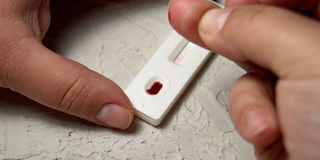When campaign on HIV self-testing gets weirder

The artistes featured in the "Chukua Selfie" song should have instead toured the country to advocate for HIV/AIDS self-testing among the youth. PHOTO | FILE | NATION MEDIA GROUP
What you need to know:
- I highly doubted that the young men, after watching the shaking bottoms, and a stripper pole dancing, would be motivated to get themselves tested for HIV.
- The National Aids Control Council announced that youths aged between 15 and 24 report the highest new HIV/Aids infections.
With all that bum-shaking in hit song "Chukua Selfie", will the youth really check their status?
I am not a voracious listener of music. In fact, I only listen to it when I find myself where it is playing, and only go out of my way, purely out of curiosity, to listen to a song if people are talking about it. This is what I did when I kept hearing mention of that hit song, "Chukua Selfie".
If you haven’t heard about it yet, the song is a collabo featuring musicians Fena Gitu, Khaligraph Jones, Nyashinski, Naiboi, and Juacali.
The colourful video is world class, and according to my uneducated ears, the musicians outdid themselves — Fena was especially in her element.
Anyway, my curiosity satisfied, I forgot all about the song. Until I learnt that it was part of a campaign to encourage young men, specifically those between 18-24 years, to know their HIV status through a self-test kit, (hence the name of the song, "Chukua Selfie") that one can use in the comfort of their home.
I have to say that I was confused, and not just by the name of the song, because I wondered what the sexual connotation in the song had to do with taking a selfie.
WASTED OPPORTUNITY
I was confused because in that video, women suggestively gyrate their generously endowed bare bottoms in your face, in the faces of these 18-24-year-old men the campaign targets.
I highly doubted that the young men, after watching the shaking bottoms, and a stripper pole dancing, would be motivated to get themselves tested for HIV.
They would be motivated, but not to do what the campaign hoped they would. And yet the song has over two million views. What a wasted opportunity.
I am yet to see Nairobi’s party animals dancing to this suggestive song, but I have a feeling that those on the dance floor would dance in ways that are likely to fuel the spread of HIV if they were not the responsible kind.
What am I saying? That "Chukua Selfie" is a high class, sophisticated production delivered by some of Kenya’s most talented artistes, a definite club banger.
But one that will make the youth check their HIV status? No. Not with all that bum-shaking.
STRATEGY
Someone who agreed with me argued that the message would have reached the intended recipient had the artistes featured in the song instead toured the country to advocate self-testing, though to be fair the song might make the target audience log onto the "Chukua Selfie" page and read all about the self-testing kit and where to get it.
Early this year, the National Aids Control Council announced that youths aged between 15 and 24 report the highest new HIV/Aids infections — over 40 per cent of these new infections occur among this age group, an indication that Kenya’s youth are engaging in unprotected sex with people whose status they do not know.
It is a worrying situation, one that the government and other stakeholders, such as the initiative behind the Chukua Selfie campaign, should move in haste to contain; after all, young people hold the future of this country in their hands.
However, the message in the measures put in place to tame and reverse this situation needs to be well-thought-out to achieve the intended purpose.
If you’re a young person reading this, dance to the song, and when you’re done, take a self-test — for your sake and others.
The writer is the Editor, ‘Society’ and Magazines, ‘Daily Nation’. [email protected]





